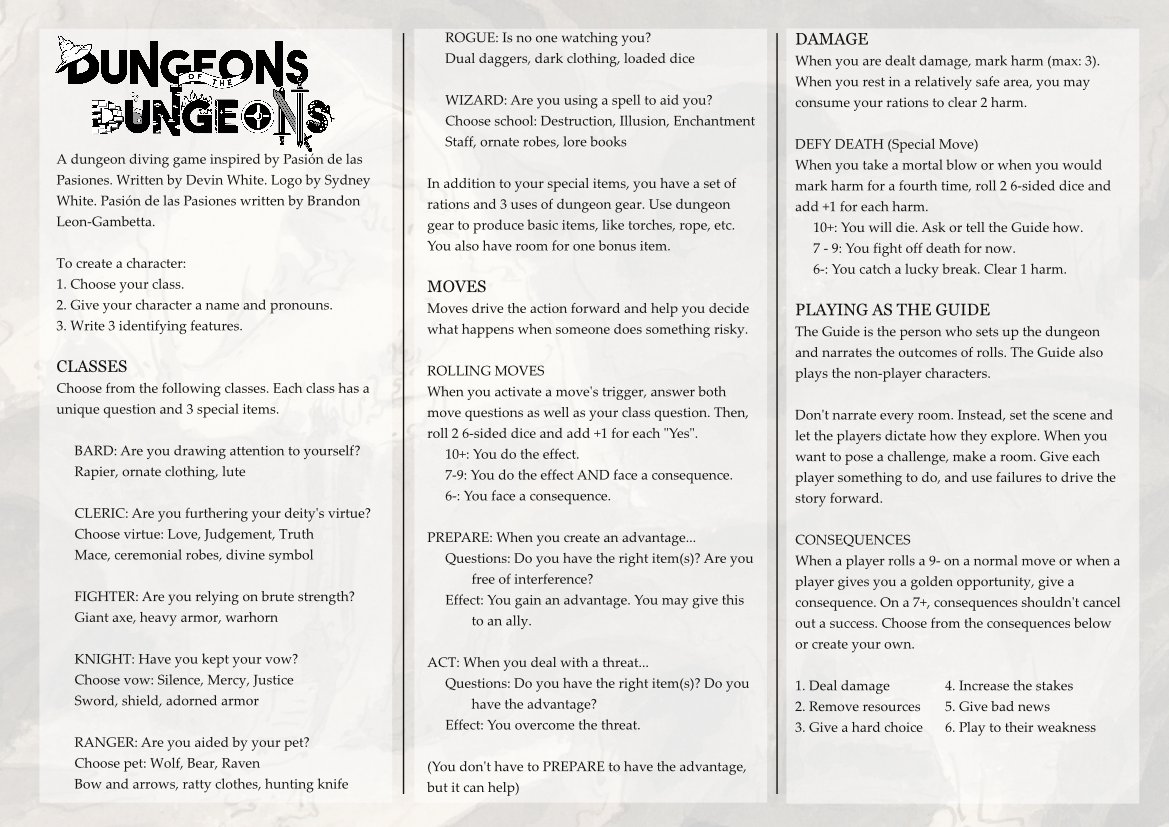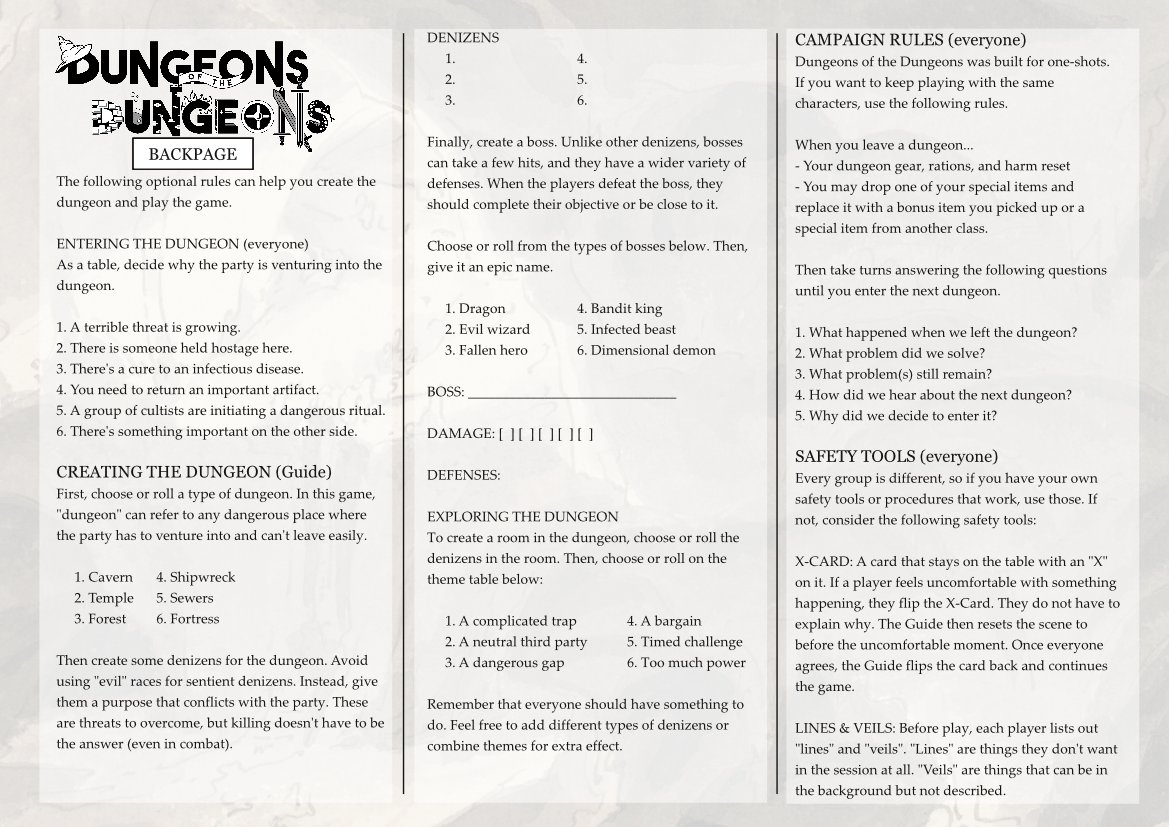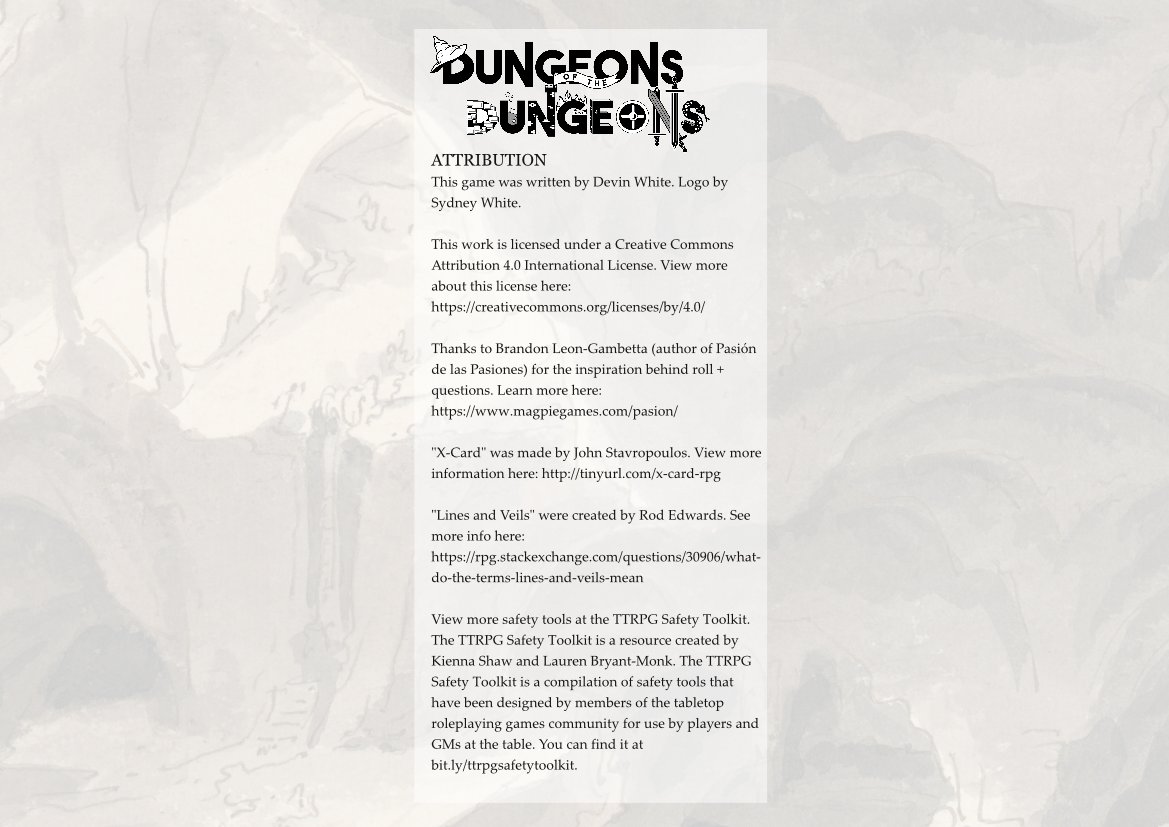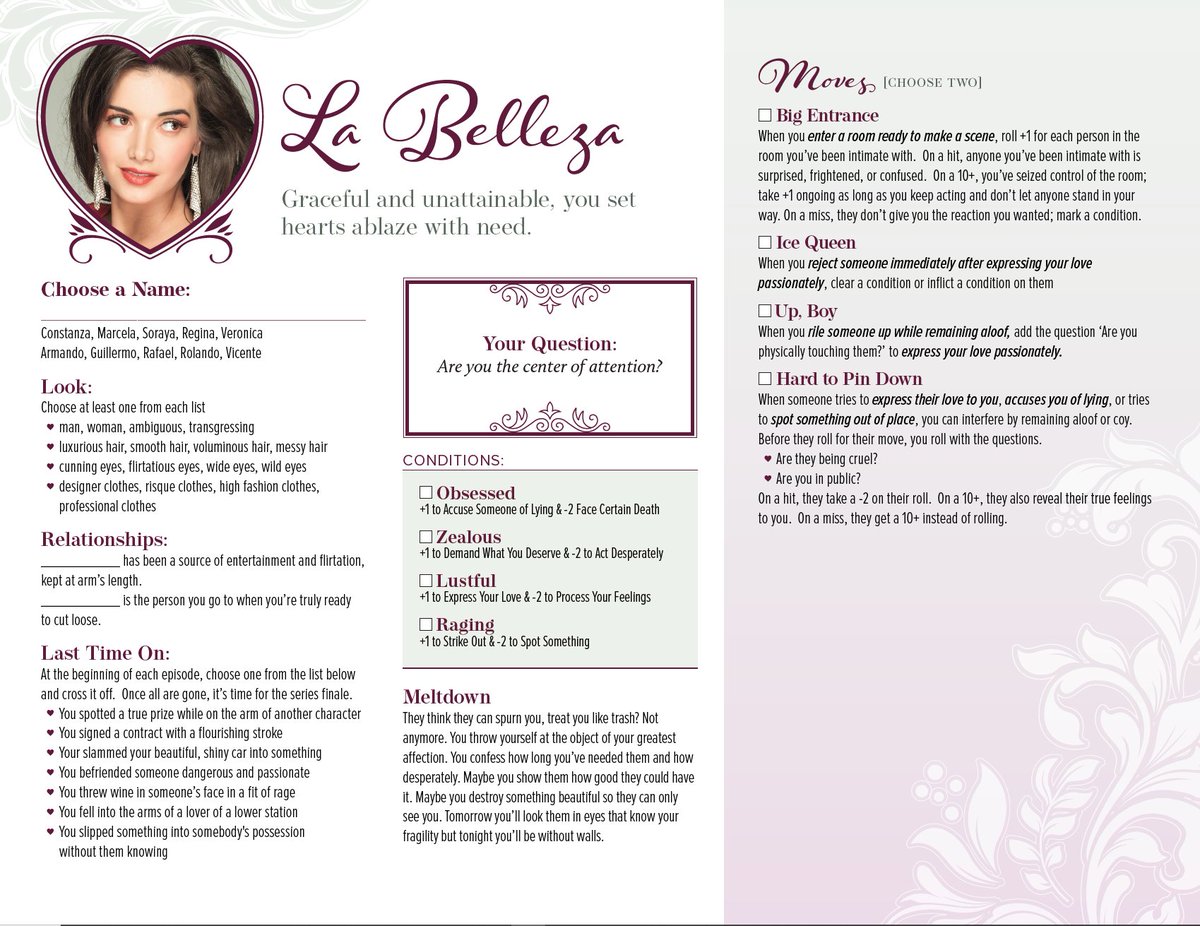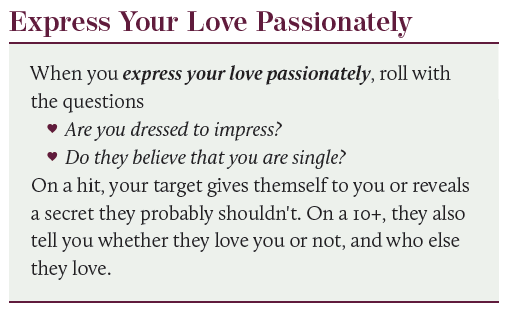The final version of Dungeons of the Dungeons is below, and you can get the PDF and print version here: https://dbones90.itch.io/dungeons-of-the-dungeons
I">https://dbones90.itch.io/dungeons-... wanted to give a thread on some of the design behind the game and why people should be looking at Pasión de las Pasiones. (1/19) #tabletopchopshop
I">https://dbones90.itch.io/dungeons-... wanted to give a thread on some of the design behind the game and why people should be looking at Pasión de las Pasiones. (1/19) #tabletopchopshop
I make no secret that the game is inspired by the telenovela game, Pasión de las Pasiones (written by @bleongambetta). It really only takes one mechanic from that game, but it& #39;s such a core and innovative mechanic that I made sure to give credit where credit is due. (2/19)
Instead of stats (like Strength or Dexterity), Pasión uses questions. Whenever you roll, you answer a series of questions and get +1 for each "Yes".
Each move has its own questions, but importantly, each playbook also has its own unique question that is *always* asked. (3/19)
Each move has its own questions, but importantly, each playbook also has its own unique question that is *always* asked. (3/19)
This does a few different things that I really like. The first one is that it gets you really engaged in the fiction.
I think triggers, the "When you do x" part, are the most interesting part of moves, and questions let you have multiple triggers for the same move. (4/19)
I think triggers, the "When you do x" part, are the most interesting part of moves, and questions let you have multiple triggers for the same move. (4/19)
Express your love passionately basically has three triggers:
- When you express your love passionately
- When you are dressed to impress
- When they believe you& #39;re single
And answering all of those questions is an interesting process. (5/19)
- When you express your love passionately
- When you are dressed to impress
- When they believe you& #39;re single
And answering all of those questions is an interesting process. (5/19)
But it& #39;s the class question that convinced me that Pasión is a game worth paying attention to.
It really highlights how often stats are unnecessary and even silly. They& #39;re a tool to get players to act a certain way, but they& #39;re inefficient and difficult to work with (6/19).
It really highlights how often stats are unnecessary and even silly. They& #39;re a tool to get players to act a certain way, but they& #39;re inefficient and difficult to work with (6/19).
Take dungeon fantasy. There& #39;s a few different archetypes central to dungeon fantasy, like the strong warrior and the stealthy rogue.
Creating a class that& #39;s just called "The Fighter" or "The Thief" isn& #39;t enough, though -- you have to reward players for playing in genre. (7/19)
Creating a class that& #39;s just called "The Fighter" or "The Thief" isn& #39;t enough, though -- you have to reward players for playing in genre. (7/19)
That& #39;s usually where stats come from. Reward the Fighter for having a high Strength and the Thief for having a high Dexterity.
That way, the Fighter is encouraged to do things that rely on strength and the Thief does things that rely on dexterity.
Seems simple, but... (8/19)
That way, the Fighter is encouraged to do things that rely on strength and the Thief does things that rely on dexterity.
Seems simple, but... (8/19)
You have to make the math work out, and not just in terms of "class balance". If you make stats do wildly different things, you risk the game just being about putting points into the "good" stats regardless of class. (9/19)
You can balance this by letting certain classes use multiple stats to do the same thing, but you still lose the identity.
I can have my Fighter attack a bandit in a frontal assault, but because the Thief has a "precise" weapon, they can do the exact same thing. (10/19)
I can have my Fighter attack a bandit in a frontal assault, but because the Thief has a "precise" weapon, they can do the exact same thing. (10/19)
You can still make it work, but history is riddled with games that got this wrong. I recommend checking out @SystemMastery for examples of games where the math misses the mark.
For starters, see the Tunnels & Trolls and Basic D&D episodes. (11/19) https://systemmasterypodcast.com/2014/08/12/dd-set-1-basic-rules-system-mastery-25/">https://systemmasterypodcast.com/2014/08/1...
For starters, see the Tunnels & Trolls and Basic D&D episodes. (11/19) https://systemmasterypodcast.com/2014/08/12/dd-set-1-basic-rules-system-mastery-25/">https://systemmasterypodcast.com/2014/08/1...
Going back to Pasión, the answer Leon-Gambetta figured out was so simple and elegant.
Want to reward the La Belleza for being the center of attention? Ask them, "Are you the center of attention?" and give them a +1 if the answer is "Yes". (12/19)
Want to reward the La Belleza for being the center of attention? Ask them, "Are you the center of attention?" and give them a +1 if the answer is "Yes". (12/19)
This lets the designer reward exactly the intended behavior. Want to make a burly class?
You could create a strength stat and make strength used for the things you want this class to do... or you could just give them a bonus if they& #39;re relying on their brawn. (13/19)
You could create a strength stat and make strength used for the things you want this class to do... or you could just give them a bonus if they& #39;re relying on their brawn. (13/19)
On one hand, I feel a bit lame taking this really well-designed game about romance and drama and turning it into a dungeon crawler, but this game came about from a simple thought exercise.
I thought, "Could this actually work?" I found that it was really, really easy. (14/19)
I thought, "Could this actually work?" I found that it was really, really easy. (14/19)
Need to reward the rogue for being sneaky? Ask, "Is no one watching you?"
Need to reward the Ranger for working with their pet? Ask, "Are you aided by your pet?"
Need to reward the Bard for being an ass? Ask, "Are you drawing attention to yourself?" (15/19)
Need to reward the Ranger for working with their pet? Ask, "Are you aided by your pet?"
Need to reward the Bard for being an ass? Ask, "Are you drawing attention to yourself?" (15/19)
(Side note: I love that question for the Bard because it means that their lute isn& #39;t used for any magical purpose. It& #39;s just to make people look at them. The Bard is basically the guy who brings his guitar everywhere he goes) (16/19)
In designing Dungeons of the Dungeons, I realized that stats are a tool, not a goal, and they& #39;re clunky.
Games can and often should still use them (Masks is a great example of stats used well), but rolling with questions gives you so much more flexibility. (17/19)
Games can and often should still use them (Masks is a great example of stats used well), but rolling with questions gives you so much more flexibility. (17/19)
When I first revealed the prototype for DotD, I said Pasión could be the next evolution in the PBTA space, and this is what I meant by it.
It& #39;s so easy to make playbooks in genre. I& #39;m just waiting for other designers to start using these tools. (18/19) https://twitter.com/DevTheGuy/status/1287593903751921664?s=20">https://twitter.com/DevTheGuy...
It& #39;s so easy to make playbooks in genre. I& #39;m just waiting for other designers to start using these tools. (18/19) https://twitter.com/DevTheGuy/status/1287593903751921664?s=20">https://twitter.com/DevTheGuy...

 Read on Twitter
Read on Twitter